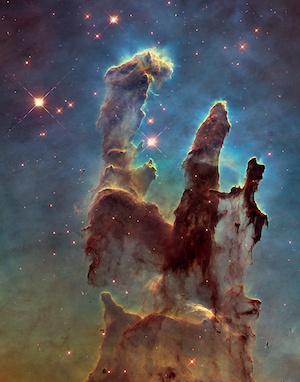
On Earth, we see that everything has its own sense of time: if you try to catch a fly, it is usually gone before your hand is even close. The fly experiences your hand as something that comes on quite slowly, but does pose a danger. If you let your hand come closer very slowly, the fly will stay put because your hand is stationary in its experience. In our experience, a plant also seems to stand still, while it is indeed growing and moving. In this way everything and everyone has a subjective experience of what we call ‘reality’.
Suppose you took a picture of a heart, and then another one millisecond later, you could conclude that the heart is shrinking or expanding. If you don’t know what a heart is for, how it works, and what it is a part of, you might conclude that it will either continue to shrink until it cannot shrink any further, or that it will continue to expand forever and ever. You would probably not be able to imagine that it makes a pumping movement with the limited information. Because we ourselves have a heart and know what it is for, the ideas described above will not occur to us. Similarly, we have very limited knowledge of the universe, yet we make assumptions about it.
When we do measurements, we want them to always have the same result. The so-called constants, such as the speed of light, turn out not to be constant, but adaptable. For example, between 1928 and 1945, the speed of light was about 20 kilometers per hour slower than before and after that period, which is a significant difference. They were not measurement errors, yet such results are swept under the rug. Everything has to be reproducible, otherwise it’s not scientific. But perhaps the survival of the universe requires natural laws to be adaptable; just like our blood pressure must be able to change in order to get oxygen to the right place on time?
We are also still missing 95% of the mass of the universe. To reconcile theory and practice, we invent terms like dark matter (27% of the universe) and dark energy (68% of the universe). This immeasurable mass keeps galaxies in our models from falling apart, despite a huge lack of observable mass.
There is a theory that gives substance to these vague terms: it says that information is a fundamental building block and that that information is energy and has mass. If true, it would mean that information exerts gravity. Of course, this power is extremely weak, making it undetectable (it remains ‘dark’). The theory may put the future of the universe in a different light.
The scientific theories about this future – a Big Crunch, a Big Rip, a Big Freeze… – are not very uplifting. The Big Bounce theory sounds better, but it just means that the Big Crunch is followed by another Big Bang.
Now imagine a Big Beat universe that shrinks again after billions of years of expansion and then expands again, without all information being destroyed. Isn’t that a much nicer thought? And you can believe in it without it having to be true. Just as you can believe in the Big Crunch; that doesn’t have to be true either.
It may be terribly unscientific (although in my view it should be the very essence of science), but I see intelligence, self-organization and love everywhere. My reality is of course subjective, science (if there is such a thing as one science at all) wants objective observations. But if you can only study 5% of reality with it, you only have a very limited view. To then say something with certainty is the same as saying that you have been to all countries because you have leafed through the atlas once. Of course I don’t know either; it’s just a thought.
It does indicate that we create our reality with our thoughts. We can choose to believe that a trend will always continue, that what is happening now will only get worse. That is quite fatalistic, and in my view such a prophecy fulfils itself. We can also believe that there are always immeasurable, invisible forces at play that always provide balance. In the universe, but also in ecological and social systems. At a time when despair is always lurking, I find that a comforting thought.
